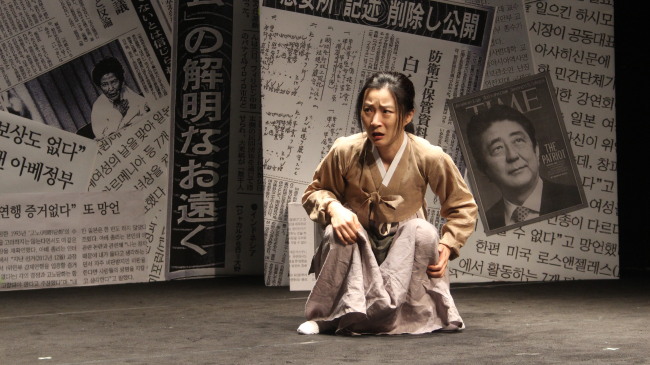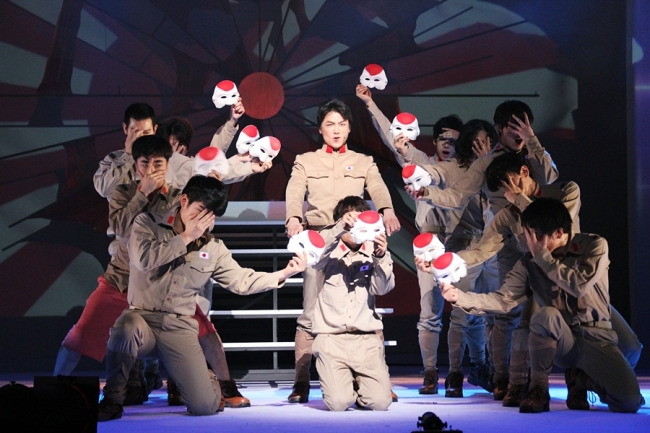Stories of ‘comfort women’ revived on stage
Two plays explore challenges of former wartime sex slaves
By Korea HeraldPublished : July 15, 2014 - 20:06
During World War II, approximately 200,000 women across Asia ― some as young as 11 years old ― were taken to frontline “comfort stations” to provide sex to the Imperial Japanese Army troops. Most came from Korea, then a Japanese colony.
Seven decades later, these women, euphemistically called “comfort women,” are in their ’80s and ’90s and demanding an apology and compensation from Japan for what they had to go through.
The number of surviving Korean victims is down to 54. Still, justice seems to be far away. Japan recently undermined the authority of its landmark 1993 apology by casting it as a result of a behind-closed-doors political deal between Seoul and Tokyo.
While Korea and Japan lock horns over wartime atrocities, some artists in the two countries have sought out the stories of the victims and recreated them into art works.
The Korea Herald introduces two recent stage productions ― one a theatrical play and the other a musical ― which bring audiences closer to the brutal history and the victims who still struggle to have their stories heard.
‘Liar Young-ja’
Veteran Japanese playwright, Fujita Asaya, has taken the comfort women issue to the stage for the second time. His play, “Liar Young-ja,” first premiered in Korea and Japan in 1995.
“Twenty years have passed, but nothing has changed,” Fujita said in a press conference earlier this month. “In fact, it has gotten worse as the Japanese government is trying to neglect and hide their past again. That’s why I am showing it again. I can’t stand them getting away with their unsettled atrocity.”
Seven decades later, these women, euphemistically called “comfort women,” are in their ’80s and ’90s and demanding an apology and compensation from Japan for what they had to go through.
The number of surviving Korean victims is down to 54. Still, justice seems to be far away. Japan recently undermined the authority of its landmark 1993 apology by casting it as a result of a behind-closed-doors political deal between Seoul and Tokyo.
While Korea and Japan lock horns over wartime atrocities, some artists in the two countries have sought out the stories of the victims and recreated them into art works.
The Korea Herald introduces two recent stage productions ― one a theatrical play and the other a musical ― which bring audiences closer to the brutal history and the victims who still struggle to have their stories heard.
‘Liar Young-ja’
Veteran Japanese playwright, Fujita Asaya, has taken the comfort women issue to the stage for the second time. His play, “Liar Young-ja,” first premiered in Korea and Japan in 1995.
“Twenty years have passed, but nothing has changed,” Fujita said in a press conference earlier this month. “In fact, it has gotten worse as the Japanese government is trying to neglect and hide their past again. That’s why I am showing it again. I can’t stand them getting away with their unsettled atrocity.”

The play centers on Young-ja, a 14-year-old Korean girl who lives in the countryside peacefully with her family.
The young girl is deceived into boarding a ferry that she was told would take her to Shimonoseki, Japan, where she will work at a restaurant and send money back to her family in Korea. But the boat instead takes her to a frontline Japanese military brothel, where she and other women are forced to live as sex slaves for the Japanese military.
For three years, she is raped by 40 to 60 soldiers a day, starved, beaten and abused, until World War II ends with Japan surrendering. Finally, she returns home to find that many things have happened since she left.
“What hurts me the most is the fact that no one asks me any questions about my three-year absence, not the fact that I can’t get married and have a family like other girls of my age,” cries Young-ja during a monologue.
After a few years, a Japanese reporter visits her to ask about her life in a comfort station, and she decides to tell her story.
But rather than evoking sympathy, her experience evokes questions. She is even condemned as a liar for making the story up.
“Young-ja is not a liar, but the title accuses society of making her the liar,” commented Fujita.
“Liar Young-ja” runs until July 20 at Theater Jungmiso in Daehangno, Seoul. Ticket prices are 30,000 won for adults, 20,000 won for college students and 15,000 won for middle and high school students. For more information, call 070-4066-2400.
‘Wedding Shoes’
The first musical with a theme of comfort women, “Wedding Shoes,” premiered early this month in the southeastern city of Daegu during an international musical festival.
“It was just overwhelming,” producer Lee Jong-seo said of the premiere, talking over the telephone. “We’re opening in Seoul soon. I thank all the people who have supported this production. Without them, it wouldn’t have been possible,” he added.

The musical is based on the true stories of three survivors whom Lee met through the House of Sharing, a shelter where former comfort women live.
It follows the story of Soon-ok, a 16-year-old girl from a poor peasant family happily engaged to the love of her life, Yun-jae. On the day of their wedding, however, her humble but happy life turns into a nightmare as she is enlisted against her will as a prostitute to “service” Japanese soldiers at the war front. Yun-jae, too, is conscripted into the Japanese army.
The show is not just about the torturous life of Soon-ok at the military brothel. It also deals much with her life afterwards, as she returns home after the war only to face social stigma, ostracism and shame.
Veteran musical actress Kang Hyo-sung plays Soon-ok, opposite Seo Beok-seok as Yun-jae. The cast also includes veteran TV actor Kim Jin-tae and singer Yoon Bok-hee.
It is directed by Kim Geun-han, with lyrics written by Ok Kyung-sun and music by Jo Sun-hyung.
“Everyone in this production, from lead actors and actresses to staff, is doing this pro bono,” the producer said. Half of the proceeds from the show will go to the House of Sharing, he added.
“Wedding Shoes” will open on July 25 at Mapo Art Center and run through Aug. 17. Ticket prices range from 55,000 won to 99,000 won.
By Lee Sun-young and Ahn Sung-mi
(milaya@heraldcorp.com) (sahn@heraldcorp.com)
-
Articles by Korea Herald










![[Hello India] Hyundai Motor vows to boost 'clean mobility' in India](http://res.heraldm.com/phpwas/restmb_idxmake.php?idx=644&simg=/content/image/2024/04/25/20240425050672_0.jpg&u=)









